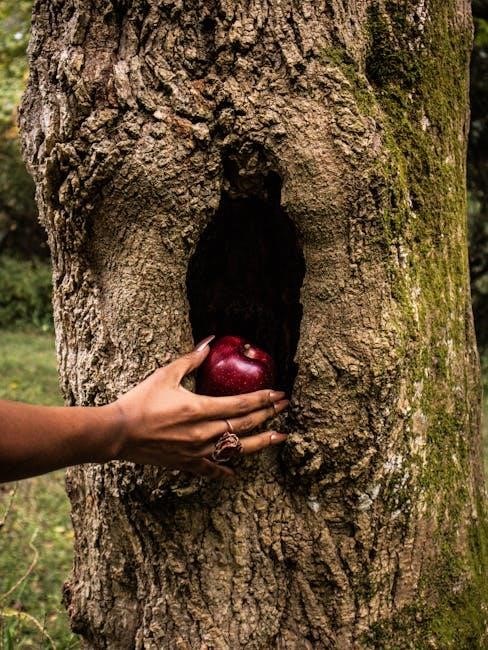Discover Chinua Achebe’s iconic novel through free PDF downloads, offering insights into Igbo culture and colonial impact, while providing accessible resources for deeper understanding and analysis.
Overview of the Novel
Things Fall Apart, written by Chinua Achebe in 1958, is a seminal work of African literature. The novel centers on Okonkwo, a fiercely independent Igbo farmer in the fictional village of Umuofia, set in the late 19th century. It explores themes of culture, identity, and the devastating impact of colonialism. Achebe masterfully portrays the rich traditions of the Igbo people, while also highlighting the internal tensions within their society. The novel follows Okonkwo’s struggles with masculinity, family, and the encroachment of British colonial rule, which disrupts the delicate balance of his world. Through vivid storytelling, Achebe challenges stereotypes and offers a powerful narrative of cultural clash and personal tragedy, making Things Fall Apart a timeless classic in world literature.
Author Chinua Achebe
Chinua Achebe, a Nigerian novelist, poet, and critic, is best known for Things Fall Apart, his groundbreaking debut novel. Born in 1930 in Ogidi, Nigeria, Achebe grew up in a traditional Igbo family, which deeply influenced his writing. He studied English literature at the University of Ibadan and later worked as a broadcaster and educator. Achebe’s work challenges Western narratives about Africa and explores the complexities of colonialism, culture, and identity. His writing is celebrated for its rich storytelling, nuanced characters, and historical depth. Through Things Fall Apart, Achebe has become a pivotal figure in African literature, reshaping global perceptions of the continent and its people.
Relevance of the Novel in Modern Literature
Things Fall Apart remains a cornerstone of modern literature, offering profound insights into cultural identity, colonialism, and societal change. Its exploration of Igbo traditions and the clash with Western values resonates universally, making it a vital text for postcolonial studies. Achebe’s vivid storytelling and nuanced characters challenge Eurocentric narratives, providing a necessary African perspective. The novel’s themes of masculinity, tradition, and resilience continue to inspire contemporary authors and readers. Its relevance is further amplified by its accessibility in digital formats, such as free PDFs, ensuring its enduring influence in educating and enlightening global audiences about Nigeria’s rich cultural heritage and the complexities of colonial history.

Plot Summary of “Things Fall Apart”
Things Fall Apart tells the story of Okonkwo, a respected Igbo man in Umuofia, navigating cultural traditions, personal struggles, and colonial disruption in 19th-century Nigeria.
Setting: Umuofia and the Igbo Culture
The novel is set in the late 19th century in Umuofia, a fictional village in Nigeria, part of the Igbo society. Umuofia and its surrounding villages represent the heart of Igbo culture, rich in traditions, agriculture, and communal values. The setting highlights the Igbo people’s deep connection to their land, religion, and social structures, such as the Oracle of the Hills and the system of village leaders. Achebe vividly portrays the vibrant life of Umuofia, emphasizing its balance and harmony before the arrival of colonial forces. This cultural backdrop is crucial for understanding the novel’s exploration of identity, tradition, and the impact of colonialism on indigenous societies.
Main Character: Okonkwo
Okonkwo, a central figure in “Things Fall Apart,” is a strong and complex character, embodying the values of his Igbo culture. As a skilled wrestler and hardworking farmer, he earns respect in his village, Umuofia. However, his rigid adherence to traditional masculinity and fear of resembling his lazy father, Unoka, drive his often harsh behavior. Throughout the novel, Okonkwo faces internal and external conflicts, including the challenges of colonialism, which threaten his way of life. His struggles and ultimate downfall reveal the tragic consequences of cultural upheaval and the rigidity of societal expectations, making him a tragic hero in Achebe’s exploration of identity and change.
Key Events in the Novel
Central to the narrative are pivotal moments that shape Okonkwo’s journey. His accidental killing of a young man during a funeral leads to seven years of exile. Upon returning, he faces cultural shifts and personal losses, including the death of his adopted son, Ikemefuna, which haunts him deeply. The arrival of British colonizers disrupts Igbo traditions, leading to internal conflicts and external pressures. Okonkwo’s pride and rigidity are tested when his son, Nwoye, embracing Christianity, and his eventual defiance against colonial rule result in tragic consequences, culminating in his downfall and the dissolution of his community.
Themes and Symbolism
Things Fall Apart explores themes of cultural identity, colonialism, and masculinity through rich symbolism. The yam, a staple crop, symbolizes strength and status, reflecting Okonkwo’s pride and societal expectations. The novel’s title, inspired by Yeats’ poem, signifies the inevitable collapse of traditions. The clash between Igbo customs and Christian missionaries highlights cultural conflict, while Okonkwo’s rigid masculinity underscores internal struggles. These themes and symbols weave together to depict a society in flux, providing profound insights into the human experience and colonial impact. The narrative’s depth ensures its relevance in understanding cultural resilience and change, making it a timeless literary masterpiece. The interplay of themes and symbols enriches the story, offering layers of meaning for readers to explore.
Downloading “Things Fall Apart” for Free
Access Chinua Achebe’s “Things Fall Apart” freely via PDFDrive.to without payment or registration, offering readers convenient digital access to this literary masterpiece anytime.
Where to Find the Free PDF
Chinua Achebe’s “Things Fall Apart” can be downloaded for free from platforms like PDFDrive.to, which offers the novel in PDF format without requiring payment, subscription, or registration. This convenient option allows readers to access the full text instantly. Additionally, free PDF versions of the novel are available on various educational and literary websites, providing easy access to this seminal work of African literature. Ensure to verify the credibility of the source to avoid unauthorized or low-quality downloads. The availability of free PDFs makes it accessible to a global audience, fostering broader engagement with Achebe’s exploration of Igbo culture and colonialism.
Legality and Ethics of Free Downloads
Downloading “Things Fall Apart” for free raises legal and ethical concerns. While some websites offer free PDF versions, they may violate copyright laws, as Chinua Achebe’s work remains under copyright in many countries. Accessing pirated copies deprives authors and publishers of rightful compensation. Ethically, it is important to support creators by purchasing legitimate copies or borrowing from libraries. Free downloads from unauthorized sources undermine the literary ecosystem and discourage investment in new works. Respect for intellectual property promotes a fair system that benefits authors and readers alike. Always consider the legal and moral implications before downloading copyrighted material.
Benefits of Accessing the Novel Digitally
Accessing “Things Fall Apart” digitally offers numerous advantages. A free PDF download allows readers to carry the novel anywhere, making it convenient for on-the-go reading. Digital versions often include searchable text and adjustable fonts, enhancing readability. Students and educators can easily highlight and annotate important passages for study purposes. Additionally, digital access reduces physical storage needs and provides instant availability. For those with limited access to physical books, free PDFs make the novel more accessible. However, it is crucial to ensure that the source is legal and ethical to avoid infringing on copyright laws. Digital formats also facilitate sharing and collaboration, fostering broader discussions and analyses of the text.

Cultural and Historical Context
Set in pre-colonial Nigeria, the novel explores Igbo traditions and societal norms, highlighting the clash between indigenous culture and colonial influence that shaped the region’s history and identity.
The Igbo People and Their Traditions
The Igbo people, an ethnic group from southeastern Nigeria, have a rich cultural heritage deeply rooted in communal living and spiritual beliefs. Their traditions, as depicted in Things Fall Apart, revolve around respect for elders, the Oracle of the Hills and Caves, and the importance of agriculture. The Igbo society is communal, with decisions made through a council of elders, emphasizing unity and collective responsibility. Their religious practices involve ancestor worship and a strong belief in deities, which guide their moral and social norms. The novel highlights their vibrant traditions, such as wrestling matches and festivals, which foster community bonding. Accessing the free PDF of Things Fall Apart provides a deeper understanding of these customs and their significance in Igbo culture.
Colonialism and Its Impact on the Igbo Society
Colonialism profoundly disrupted the Igbo society, as depicted in Things Fall Apart. The arrival of British colonizers led to the erosion of traditional Igbo social structures, replacing them with foreign systems of governance and religion. The Igbo people faced cultural disintegration, as their communal way of life was undermined by imposed Western values. The novel highlights the clash between indigenous traditions and colonial forces, leading to the destruction of social cohesion. The free PDF version of the novel offers a detailed exploration of these themes, providing insights into how colonialism reshaped the Igbo identity and way of life. This digital resource allows readers to analyze the profound impact of colonialism on the Igbo society in depth.
Religious Beliefs and Practices in the Novel
The Igbo people in Things Fall Apart hold deep religious beliefs rooted in their ancestral traditions. They worship multiple deities and spirits, believing in a complex spiritual system that guides their daily lives. The Oracle of the Hills and Caves plays a central role, serving as a divine authority for the community. Religious practices, such as sacrifices and rituals, are integral to maintaining balance and harmony. However, the arrival of Christianity disrupts these beliefs, creating tension between traditional practices and foreign religious influences. The free PDF version of the novel provides a detailed exploration of these religious dynamics, highlighting their significance in shaping the Igbo identity and societal structure. This digital resource offers readers a deeper understanding of the interplay between spirituality and cultural change.

Themes and Analysis
Exploring themes like cultural identity, masculinity, and colonialism in Achebe’s Things Fall Apart, the free PDF offers insights into societal change and individual struggles, enriching reader understanding.
Cultural Conflict and Identity
Things Fall Apart by Chinua Achebe delves into the profound cultural conflict between traditional Igbo values and the encroaching influence of British colonialism. The free PDF highlights how Okonkwo, a proud Igbo leader, grapples with the erosion of his cultural identity. Achebe vividly portrays the clash of beliefs, as Christian missionaries disrupt the Igbo way of life, leading to internal and communal strife. The novel explores themes of cultural disintegration and the struggle to maintain one’s heritage in the face of external forces. Through the free PDF, readers gain insight into the complexities of identity and the devastating impact of colonialism on indigenous cultures, making it a vital resource for understanding these timeless themes.
The Role of Masculinity
The free PDF of Things Fall Apart emphasizes masculinity as a central theme, particularly through Okonkwo, a character defined by his rigid adherence to traditional Igbo ideals of manhood. Okonkwo’s fear of appearing weak, stemming from his father’s effeminate reputation, drives his aggressive behavior and strict parenting. The novel critiques toxic masculinity, showing how Okonkwo’s inability to express emotion or tolerate vulnerability leads to his downfall. His treatment of his children, especially Nwoye and Ikemefuna, highlights the consequences of prioritizing strength over empathy. The free PDF version allows readers to explore how Achebe portrays masculinity as both a cultural construct and a source of personal and societal conflict, offering a nuanced perspective on its impact in Igbo society.
Colonialism and Its Aftermath
The free PDF of Things Fall Apart explores colonialism’s devastating impact on Igbo society, as British rule disrupts traditional customs and values. The arrival of Christian missionaries and colonial administrators undermines the indigenous culture, leading to widespread confusion and conflict. Okonkwo’s resistance to these changes symbolizes the broader struggle of his people to maintain their identity. The novel highlights how colonialism eroded communal bonds, imposed foreign systems, and reshaped social hierarchies. Through the lens of Okonkwo’s tragic downfall, Achebe illustrates the irreversible consequences of colonial interference. The free PDF provides a vivid portrayal of how colonialism shattered the Igbo world, leaving behind a fractured society grappling with loss and transformation.

Study Guide and Resources
Access Things Fall Apart study guides, lesson plans, and essay topics for free. These resources help educators and students delve into themes, characters, and cultural contexts effectively.
Lesson Plans for Educators
Educators can enhance their teaching of Things Fall Apart with free downloadable lesson plans. These resources provide structured units, discussion prompts, and activities to explore themes like cultural identity and colonialism. Teachers can access guides that break down the novel into manageable sections, focusing on key characters such as Okonkwo and his struggles with tradition and change. Additionally, these plans often include essay topics, reading comprehension exercises, and cultural context materials. They are designed to foster critical thinking and deepen students’ understanding of the Igbo society and its clash with colonial forces. By leveraging these free resources, educators can create engaging and insightful learning experiences for their students.
Essay Topics and Writing Guides
Students and educators can access free essay topics and writing guides for Things Fall Apart, helping to explore themes like cultural conflict, masculinity, and colonialism. These resources provide prompts such as analyzing Okonkwo’s struggle with identity or the impact of British colonization on Igbo traditions. Guides also offer tips for brainstorming and structuring essays, ensuring clear arguments and insightful analysis. Free PDF materials often include sample essays and writing strategies, enabling learners to grasp key themes and historical context effectively. These tools are invaluable for developing critical thinking and producing compelling written work on Achebe’s seminal novel.

Discussion Questions for Students
Engage students with thought-provoking questions about Things Fall Apart, such as: How does Okonkwo’s character evolve throughout the novel? What role does masculinity play in his identity? How does colonialism disrupt Igbo traditions? These questions encourage critical thinking and exploration of themes like cultural conflict and identity. Free PDF resources provide additional insights, aiding students in analyzing Okonkwo’s struggles and the societal shifts. Discussions can also focus on symbolic elements, like the title’s connection to W.B. Yeats’ poem, and how they reflect the novel’s themes. These questions help deepen understanding of Achebe’s portrayal of colonial impact and cultural transformation.

Legacy of the Novel
Things Fall Apart remains a cornerstone of African literature, reshaping global perceptions of culture and identity while inspiring countless adaptations and interpretations, ensuring its timeless relevance today.
Impact on African Literature
Chinua Achebe’s Things Fall Apart revolutionized African literature by presenting a powerful, authentic portrayal of Igbo culture, challenging colonial narratives and Eurocentric perspectives. Its profound exploration of identity, tradition, and colonialism set a new standard for storytelling, inspiring a generation of African writers. The novel’s success demonstrated the global relevance of African voices, reshaping literary canons worldwide. As a free PDF, it remains accessible, enabling widespread education and discussion. Its influence extends beyond literature, fostering cultural pride and dialogue about colonial histories. Achebe’s work continues to empower writers and readers, solidifying its legacy as a cornerstone of African literary heritage.
Reception and Reviews
Chinua Achebe’s Things Fall Apart has received widespread acclaim for its authentic portrayal of Igbo culture and its critique of colonialism. Critics praise its rich storytelling, complex characters, and historical depth, making it a landmark of African literature. The novel has been celebrated for challenging Eurocentric narratives and offering a powerful African perspective. Readers worldwide have embraced its universal themes of identity, tradition, and change. Available as a free PDF, the novel’s accessibility has further amplified its impact, making it a staple in educational curricula and literary discussions. Its enduring relevance underscores its importance as a classic of post-colonial literature, resonating with readers across generations.
Adaptations and Interpretations
Chinua Achebe’s Things Fall Apart has been adapted into films, plays, and TV series, further enhancing its global reach. A 1999 Nigerian film adaptation brought the story to life, while stage productions have reimagined Okonkwo’s journey for diverse audiences. The availability of free PDF versions has democratized access, inspiring reinterpretations and fostering creative adaptations across media. The novel’s themes resonate universally, allowing artists to explore its rich cultural tapestry. These adaptations highlight the enduring relevance of Achebe’s work, ensuring its message continues to evolve and connect with new generations. The free PDF format has also enabled educators to incorporate the novel into interactive lesson plans, enriching students’ engagement with its powerful narrative.
The free PDF of “Things Fall Apart” ensures Achebe’s timeless story remains accessible, preserving its cultural legacy for future generations to explore and appreciate deeply.
Final Thoughts on the Novel
Things Fall Apart remains a profound exploration of cultural identity, masculinity, and colonialism. Its vivid portrayal of Igbo traditions and the disruptive force of colonialism offers timeless insights. The novel’s accessibility via free PDF ensures its enduring relevance for students and educators, fostering deeper understanding of African culture and history. Achebe’s masterpiece continues to resonate globally, prompting reflections on cultural resilience and change. Its themes of identity and societal transformation remain universally relevant, making it a cornerstone of modern literature. Reading the full text is essential for grasping the richness of Achebe’s storytelling and the historical context he so masterfully portrays.
Encouragement to Read the Full Text
Reading the full text of Things Fall Apart is an invaluable experience, offering deeper insights into Igbo culture, colonialism, and the complexities of human identity. Through Okonkwo’s journey, Achebe masterfully explores themes of masculinity, tradition, and societal change, providing a rich tapestry of emotions and reflections. The novel’s accessible language and universal themes make it a compelling read for anyone interested in cultural studies or historical fiction. With free PDF versions widely available, there’s never been a better time to immerse yourself in this groundbreaking work. Engaging with the full text ensures a comprehensive understanding of Achebe’s profound commentary on colonialism’s impact and the resilience of cultural identity.

